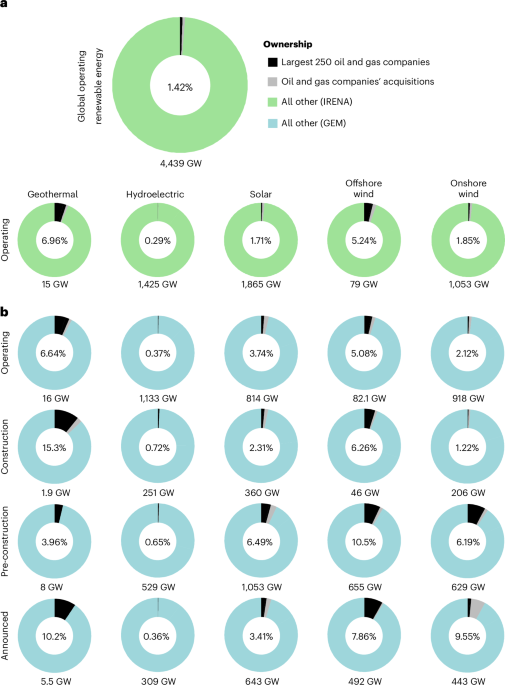Van Asselt, H. & Green, F. COP26 and the dynamics of anti-fossil fuel norms. WIREs Clim. Change 14, e816 (2023).
Guo, Y., Yang, Y., Bradshaw, M., Wang, C. & Blondeel, M. Globalization and decarbonization: changing strategies of global oil and gas companies. WIREs Clim. Change 14, e849 (2023).
Halttunen, K., Slade, R. & Staffell, I. We don’t want to be the bad guys’: oil industry’s sensemaking of the sustainability transition paradox. Energy Res. Soc. Sci. 92, 102800 (2022).
Lamb, W. F. et al. Discourses of climate delay. Glob. Sustain. 3, e17 (2020).
Megura, M. & Gunderson, R. Better poison is the cure? Critically examining fossil fuel companies, climate change framing, and corporate sustainability reports. Energy Res. Soc. Sci. 85, 102388 (2022).
Supran, G. & Oreskes, N. Assessing ExxonMobil’s climate change communications (1977–2014). Environ. Res. Lett. 12, 084019 (2017).
Bonneuil, C., Choquet, P. L. & Franta, B. Early warnings and emerging accountability: total’s responses to global warming, 1971–2021. Glob. Environ. Change 71, 102386 (2021).
Bukold, S. The Dirty Dozen—The Climate Greenwashing of 12 European Oil Companies (Greenpeace, 2023); https://www.greenpeace.org/static/planet4-italy-stateless/2023/08/48ce4213-report-the-dirty-dozen-climate-greenwashing-of-12-european-oil-companies.pdf
Halttunen, K., Slade, R. & Staffell, I. Diversify or die: strategy options for oil majors in the sustainable energy transition. Energy Res. Soc. Sci. 104, 103253 (2023).
Fattouh, B., Poudineh, R. & West, R. The rise of renewables and energy transition: what adaptation strategy exists for oil companies and oil-exporting countries?. Energy Transit 3, 45–58 (2019).
Pickl, M. J. The renewable energy strategies of oil majors—from oil to energy?. Energy Strategy Rev. 26, 100370 (2019).
Green, J., Hadden, J., Hale, T. & Mahdavi, P. Transition, hedge, or resist? Understanding political and economic behavior toward decarbonization in the oil and gas industry. Rev. Int. Political Econ. 29, 2036–2063 (2021).
Christophers, B. Fossilised capital: price and profit in the energy transition. New Political Econ. 27, 146–159 (2022).
Oil & Gas Producers Welcome Historic Paris Agreement (IOGP, 2015); https://www.iogp.org/wp-content/uploads/2017/06/PR-IOGP-welcomes-agreement-2.pdf?_gl=1*n2g98x*_up*MQ
Hill, I. Part of the solution… International Association of Oil & Gas Producers https://www.iogp.org/blog/opinions/part-of-the-solution/ (2021).
Renewable Capacity Statistics 2025 (IRENA, 2025); https://www.irena.org/-/media/Files/IRENA/Agency/Publication/2025/Mar/IRENA_DAT_RE_Capacity_Statistics_2025.pdf
UNFCCC. Decision 1/CMA.5 Outcome of the First Global Stocktake https://unfccc.int/sites/default/files/resource/cma2023_16a01E.pdf?download (United Nations, 2023).
York, R. & Bell, S. E. Energy transitions or additions?: Why a transition from fossil fuels requires more than the growth of renewable energy. Energy Res. Soc. Sci. 51, 40–43 (2019).
Slameršak, A., Kallis, G., O’Neill, D.W. & Hickel, J. Post-growth: a viable path to limiting global warming to 1.5 °C. One Earth 7, 44–58 (2024).
Levenda, A. M., Behrsin, I. & Disano, F. Renewable energy for whom? A global systematic review of the environmental justice implications of renewable energy technologies. Energy Res. Soc. Sci. 71, 101837 (2021).
Newell, P. Trasformismo or transformation? The global political economy of energy transitions. Rev. Int. Political Econ. 26, 25–48 (2019).
Unit Converter (IEA, 2024); https://www.iea.org/data-and-statistics/data-tools/unit-converter
